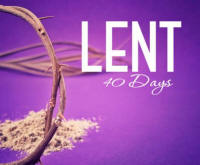|
Dear Preachers:
 Just a reminder— for those of you who preach at or attend daily Mass. We have
reflections on the Lectionary readings on our webpage:
http://www.judeop.org/ Go
to: “Daily Reflections,” “Daily Preachings,” and “Daily Homilette.” Just a reminder— for those of you who preach at or attend daily Mass. We have
reflections on the Lectionary readings on our webpage:
http://www.judeop.org/ Go
to: “Daily Reflections,” “Daily Preachings,” and “Daily Homilette.”
And thank you for your donations. I have tried to respond to you over these past
weeks, if I have missed you, I am sorry. For those who would like to support
this free bilingual service go to: http://www.judeop.org/ and click on
“Donations” at the lower left. In anticipation of your generosity, “Thank you.”
I’m sure none of us wants to get sick or suffer a serious disease. And I’m also
sure we have our own list of the very worse diseases in the catalogue of serious
illnesses, the ones we dread the most. In fact, some of us have a bit of
superstition in us and we don’t even want to discuss the subject lest the very
thing we fear might happen to us. But let’s consider one particularly poignant
ailment for a moment – amnesia.
Imagine how awful it would be to forget our past; not to remember who we are and
where we have come from. How painful and disorienting it would be to live in a
cloud of forgetfulness; to have forgotten the experiences and relationships that
have formed us; to forget who our parents and friends were, those who loved us
and helped make us into the people we are. Such a serious amnesia would, of
course, obliterate our past. But more. What good would the present be with no
history and experience to draw upon? And what value would the future have
without the past that equipped us to make wise choices about our future?
In some ways amnesia would be the very worse sickness to have because it would
seriously damage our awareness of self and our knowledge of who we are. I don’t
know if such a serious or profound amnesia exists in the medical journals. But
today’s scriptures certainly address another kind of amnesia: the forgetting of
who God is and what God has done for us. In the Deuteronomy reading Moses
addresses the Israelites and tries to help them not have willful amnesia. He
calls the faith community to remember God and keep alive the memory of the great
deeds God did to deliver them.
Moses is addressing the community at a liturgical feast, probably a festival on
which the people bring some of their harvest fruits and thankfully offer them to
God, the source of these gifts. But Moses takes the opportunity to instruct them
that they should not only remember the gifts of God from the earth, but to
especially remember the gifts God gave them in their past. Hence they are to
recall and recite their history. It all started with their earliest ancestors,
“My father was a wandering Aramean “ (perhaps this was Jacob). Their ancestors
were wandering nobodies, nevertheless, God gave them the Promise Land and made
them a great nation. Then, when they were enslaved by the Egyptians, God
delivered them, “with signs and wonders.”
Moses doesn’t want the Israelites to become amnesiacs! They should celebrate
their past because when they do, they will remember their God who was so
gracious to nobodies and made them somebodies. By their remembering what God did
in their past, they will have confidence that God will not abandon them in their
present need or in their future trials.
Today is the first Sunday of Lent. The Lenten season has begun and it is a time
to follow Moses’ advice and remember what God has done for us. Isn’t that what
Eucharist is, an “anamnesis” – a remembering, a memorial? Each time we celebrate
Eucharist we recall the great deeds God has done for us in Christ – and more. We
will hear Jesus’ words at this celebration, “Do this in remembrance of me.” It
is not merely a looking backward so as not to forget what God did for us in the
past. Rather, when we recall Christ’s self offering for us, when we “remember”
him, he is made present to us. We are connected to his life, death and
resurrection.
And that’s important because our Lenten journey asks us to die to ourselves; our
selfishness and sin; our egocentric goals and plans; our focus on our own
immediate world to the neglect of the larger community. Such dying is impossible
on our own. But we remember this first Sunday in Lent that we are not on our own
for we have died with Christ in baptism and been given new life now and a
promise of resurrection with Christ in the future. It’s good to remember the
past: it gives us courage and vision for the present and hope for the future. It
is – as we address God in the Preface today – “Truly right and just to give you
thanks and praise through Jesus Christ your Son.” Want a different way to begin
Lent? We can begin this holy season, not so much by beating our breasts, but by
remembering what God has done for us and, in this Eucharist and in our daily
lives, giving thanks. Let’s try that – all through Lent.
Jesus was not an amnesiac; he did not have a problem remembering who God is and
who he was. It is clear from the gospel narratives that throughout his life
Jesus had the kinds of temptations Luke describes in today’s gospel. Perhaps we
moderns aren’t comfortable with the notion that Jesus was tempted. Or, we have a
sense that he, being who he was, could simply brush off these temptations the
way we brush away a fly from our faces. But if the gospels say he was tempted,
then he really was. The temptations were profound, not easily brushed away, for
they were about his identity as Son of God. What did it mean to be in that kind
of relationship with God, both in his personal experiences and in his ministry?
How would he deal with temptation and be faithful to God and the mission God had
given him?
The first temptation Jesus faced was about taking care of himself. He was
hungry, so what’s the big deal – why not make bread from stones? Why shouldn’t
the Son of God live a privileged life and avoid the pains and suffering the rest
of us have to suffer, after all he is special, isn’t he? But if he did take care
of himself, using his power for his own convenience, what credibility would he
have when he invited his disciples to deny themselves, pick up their cross and
follow him? Well then, what about using the powers he had to feed the hungry by
turning stones into bread or by multiplying bread? He did multiply bread and the
crowds misunderstood who he was and what the miracle meant. They came looking
for him to make him king. Those were not the kinds of followers he wanted.
The second temptation was also about how he could have lived as Son of God. He
could have used his power over the nations of the world and accomplished his
mission through force of armies and political influence. Israel always wanted to
be a powerful nation in the world and Jesus could be just the one to lead them.
But instead, he chose to be a true child of God and he placed himself under
God’s dominion and lived a life faithful to God’s way – not the way of any
worldly power.
The third temptation. Luke seems to place the temptations in order of importance
and profundity. Once again he is confronted by a temptation about his identity
as “Son of God.” “If you are the Son of God...” the temptation begins. If for no
other reason, one would know that this is an important moment because Luke
places it on the Temple parapet. (Jerusalem and the Temple are central in Luke’s
gospel.) If Jesus gave into the temptation and threw himself off the parapet,
forcing God to save him, then he could have resorted to calling on God to rescue
him from all threatening and difficult situations throughout his ministry. He
could claim his prerogative as God’s Son and, in effect, test God to keep
proving he was beloved and watched over by God. He would be asking God for
special proofs of their relationship to reassure him every time the going got
tough. We don’t have such visible proofs at our beck and call and so Jesus, one
of us, chose not to demand them for himself.
Can we trust God’s love even when life knocks us off our feet? Can we continue
to trust through long struggles when we wrestle with doubts about our own
worth?... even when we want to say to God, “I thought I was your beloved child,
how could you let this happen to me? Where are you now that I need you?” It’s
hard to trust God’s power when we are in dire distress and our faith feels frail
and God seems impotent, or indifferent to our pleas. But Jesus stayed faithful
and trusted God in similar circumstances. Because he could, now we can. The
history of Israel and the words of the prophets show that Israel frequently gave
into the very temptations Jesus encountered. Israel faulted many times in its
vocation to be God’s child. The people frequently turned away from God and
sought its own bread; fell down and worshiped false gods and often put God to
the test. We can’t pile blame on Israel – we have done the same.
Let’s not be amnesiacs. The gospel helps us keep our memory. It reminds us that
we are the beloved children of God and God spared no expense on our behalf to
assure us of our true identity. Because of Christ, we remember our past,
experience him with us in our present and do not fear our future----where we
will also discover him.
Click here for a link to this Sunday’s readings:
https://bible.usccb.org/bible/readings/030925.cfm
QUOTABLE
You thumbed grit into my furrowed brow,
marking me with the sign of mortality,
the dust of last year’s palms.
The cross you traced seared, smudged skin,
and I recalled other ashes etched into my heart
by those who loved too little or not at all.
----Elizabeth-Anne Vanek, “Extraordinary Times,” quoted in THE LIVING PULPIT,
January/March, 2000, page 34.
JUSTICE BULLETIN BOARD

We cried to the Lord, the God of our fathers, and he heard our cry and saw our
affliction, our toil and our oppression.
– Deuteronomy 26:7
How many days do we spend in blissful ignorance of the affliction, toil, and
oppression of fellow human beings who are not as fortunate as we Americans are?
Yet, we are all made in the image of God. What are we to do to make life better
for everyone? During the holy season of Lent we should all go out into the
wilderness. No, I don’t necessarily mean make a physical trip to a desert, but
rather, get out of the box of our daily lives and explore how others live.
This Lenten season, Holy Name of Jesus Cathedral Parish will once again be
participating in CRS Rice Bowl. This year marks the 50th anniversary of Catholic
Relief Services (CRS). CRS began with the desire to make a difference and they
provide a wonderful website: . http://www.crsricebowl.org stories-of-hope/ where
we can journey with families in other parts of the world. Each week of Lent, you
can visit a different family by video and while you add coins to your rice bowl
on their behalf, you can also pray for them and for your own conversion of heart
and, for fun, try recipes so that you can experience what others eat. In this
Jubilee Year of Hope, solidarity with the poor and oppressed is a rich and
meaningful way to bring hope to others and to deepen your own spiritual life; to
become God’s hands and heart in dignifying other lives.
This Lent, let us re-commit to our global family:
Jesus, Bread of Life,
As we encounter you in the Eucharist this Lent, nourish us with your love,
unite us in communion with our sisters and brothers,
showing us how we are connected.
Transform our hearts, that we may be moved to share bread for life with our
global family and work for a world where all can thrive.
Amen.
CRS Rice Bowls will be available in the narthex after all Masses. Please pick
one up for your family and begin a Lenten journey that only you can make. Hear
the cries of the poor and be the change you want to see in the world.
Barbara Molinari Quinby, MPS,
Director
Office of Human Life, Dignity, and Justice Ministries
Holy Name of Jesus Cathedral, Raleigh, NC
FAITH BOOK

Mini-reflections on the Sunday scripture readings designed for persons on the
run. “Faith Book” is also brief enough to be posted in the Sunday parish
bulletins people take home.
From today’s Gospel reading:
Jesus answered him,
“It is written, ‘One does not live on bread alone.’”
Reflection:
The tempter puts three choices before Jesus and three times Jesus responds
quoting Scripture. The story joins the presence of the Spirit with the guiding
words of Scripture. Is that how we can face temptation and stay true to our
Christian identity, from the enlightenment and formation we receive through
Scripture under the guidance of the Holy Spirit?
So we ask ourselves:
POSTCARDS TO DEATH ROW INMATES
It is time to abandon the death penalty -- not just because of what it does to
those who are executed, but because of how it diminishes all of us... We ask all
Catholics--pastors, catechists, educators and parishioners -- to join us in
rethinking this difficult issue and committing ourselves to pursuing justice
without vengeance. With our Holy Father, we seek to build a society so committed
to human life that it will not sanction the killing of any human person.
------( "Responsibility, Rehabilitation, and Restoration: A Catholic Perspective
on Crime and Criminal Justice," U.S. Catholic Bishops, Nov. 2000,)
Inmates on death row are the most forgotten people in the prison system. Each
week I am posting in this space several inmates’ names and locations. I invite
you to write a postcard to one or more of them to let them know that: we have
not forgotten them; are praying for them and their families; or, whatever
personal encouragement you might like to give them. If you like, tell them you
heard about them through North Carolina’s, “People of Faith Against the Death
Penalty.” Thanks, Jude Siciliano, OP
Please write to:........................................
-
Russell Tucker #0413011 (On death row since 2/21/96)
-
Kenneth Neal #0495163 (2/26/96)
-
Elmer R. Mc Neill #0528622 (4/9/96)
---Central Prison P.O. 247 Phoenix, MD 21131
Please note:
Central Prison is in Raleigh, NC., but for security purposes, mail
to inmates is processed through a clearing house at the above address in
Maryland.
For more information on the Catholic position on the death penalty go to the
Catholic Mobilizing Network: http://catholicsmobilizing.org/resources/cacp/
On this page you can sign “The National Catholic Pledge to End the Death
Penalty.” Also, check the interfaith page for People of Faith Against the Death
Penalty: http://www.pfadp.org/
RESOURCES
1. Two new CDs Available:
-
“First Impressions Preaching Reflections: Liturgical Year C.” Begins in Advent
and contains three reflections for almost all the Sundays and major feasts of
the year. It also has book reviews and additional essays related to preaching.
-
“Liturgical Years A, B and C.” Reflections on the three-year cycle, with Year C
updated.
If you are a preacher, lead a Lectionary-based scripture group, or are a member
of a liturgical team, these CDs will be helpful in your preparation process.
Individual worshipers report they also use these reflections as they prepare for
Sunday liturgy.
You can order the CDs by going to our webpage:
www.preacherexchange.com and
clicking on the “First Impressions” CD link on the left.
2. “Homilias Domincales” —These Spanish reflections on the Sunday and daily
scriptures are written by Dominican sisters and friars. If you or a friend would
like to receive these reflections drop a note to fr. John Boll, O.P. at
Jboll@opsouth.org.
3. Our webpage: http://www.preacherexchange.com
-
Where you will find “Preachers’ Exchange,” which includes “First Impressions”
and “Homilias Dominicales,” as well as articles, book reviews, daily homilies
and other material pertinent to preaching.
4.“First Impressions” is a service to preachers and those wishing to prepare for
Sunday worship. It is sponsored by the Dominican Friars of Raleigh, N.C. If you
would like “First Impressions” sent weekly to a friend, send a note to fr. John
Boll, OP at the above email address.
DONATIONS
If you would like to support this ministry, please send tax deductible
contributions to Jude Siciliano, O.P., whose address is listed below.
Make checks payable to: Dominican Friars of Raleigh.
Or, go to our webpage to
make an online donation:
https://preacherexchange.com/donations.htm
Thanks you and blessings on your preaching,
Jude Siciliano, O.P., Promoter of Preaching, Southern Dominican Province, USA
P.O. 12927 Raleigh, N.C. 27605 (919-833-1893, ex 224)
FrJude@JudeOP.org
FIRST IMPRESSIONS Archive
(The latest are always listed first.)
• Lent-2nd Sunday •
• Lent-1st Sunday •
• 8th SUNDAY •
• 7th SUNDAY •
• 6th SUNDAY •
• 5th SUNDAY •
|